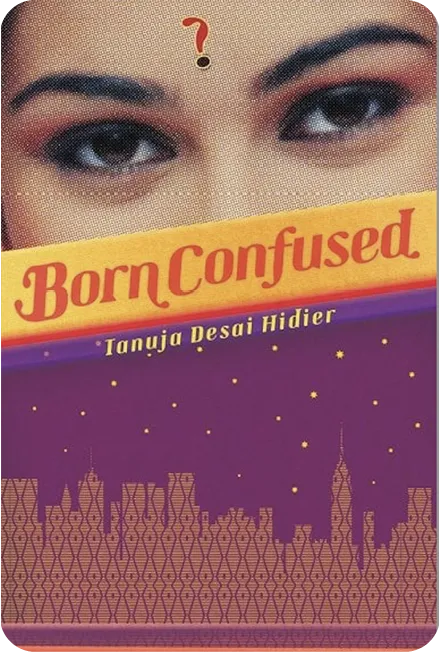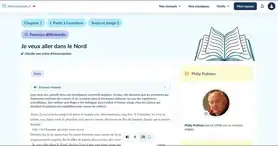Unit 5
Activity 2
Finding home in two places
Ressource affichée de l'autre côté.
Faites défiler pour voir la suite.
Faites défiler pour voir la suite.
Texte
Born Confused
Gwyn appeared the very image of the American Dream itself, the blond-rooted, blond-haired, blue-eyed Marilyn for the skinny generation. And if I was her reverse twin – the negative to her positive – that made me? The Indian nightmare? The American scream? She'd told him I was the Indian girl. The Indian girl. Somehow neither description rang completely true to me in terms of how I felt inside, but the thing was I'd never really consciously thought of myself as American, either. Of course I did the Pledge, too, along with everybody else for years of mornings, but like everyone else I wasn't really thinking about the words. I mean, I definitely wanted liberty, like Gwyn had with the car keys and no curfew, and justice for all would be great, especially in high school where people were definitely not created equal (proof: cheerleaders). But I didn't know if that had so much to do with the stars and stripes; it seemed to be more about the jeans and teams. So not quite Indian, and not quite American. Usually I felt more along the lines of Alien (however legal, as my Jersey birth certificate attests to).
The only times I retreated to one or the other description were when my peers didn't understand me (then I figured it was because I was too Indian) or when my family didn't get it (clearly because I was too American). And in India. Sometimes I was too Indian in America, yes, but in India, I was definitely not Indian enough. [...] I was the American cousin, the princess, the plumped-up one: Kavita never tired of pinching my cheeks, which I hated; they both giggled even when I'd said nothing funny and hovered around me, serving me first from the pots of fluffy rice and the silver thalis; they were always hungry to hear stories about America. Had I ever been on an escalator? Did girls talk to boys at my school? (Wide eyes when I said yes.) Was it true the stores stayed lit all night and supermarkets had aisles of just one thing and doors that slid miraculously open before you? Had I ever met a cowboy?
The only times I retreated to one or the other description were when my peers didn't understand me (then I figured it was because I was too Indian) or when my family didn't get it (clearly because I was too American). And in India. Sometimes I was too Indian in America, yes, but in India, I was definitely not Indian enough. [...] I was the American cousin, the princess, the plumped-up one: Kavita never tired of pinching my cheeks, which I hated; they both giggled even when I'd said nothing funny and hovered around me, serving me first from the pots of fluffy rice and the silver thalis; they were always hungry to hear stories about America. Had I ever been on an escalator? Did girls talk to boys at my school? (Wide eyes when I said yes.) Was it true the stores stayed lit all night and supermarkets had aisles of just one thing and doors that slid miraculously open before you? Had I ever met a cowboy?
Ressource affichée de l'autre côté.
Faites défiler pour voir la suite.
Faites défiler pour voir la suite.


Book cover of Born Confused.
Ressource affichée de l'autre côté.
Faites défiler pour voir la suite.
Faites défiler pour voir la suite.
Path A
A2+
1-A
How is Gwyn described and who is she
compared to? What does this character
represent for the narrator?
2-A
Pick out elements showing how the narrator
feels about being American and Indian.
3-A
Identify two questions the narrator's cousins
asked about life in America. How do they
make the narrator feel?
Ressource affichée de l'autre côté.
Faites défiler pour voir la suite.
Faites défiler pour voir la suite.
Path B
B1+
1-B
List reasons the narrator feels different from
both Americans and Indians.
2-B
Sum up the narrator's thoughts about the
Pledge of Allegiance.
3-B
Pick out elements that define the American
Dream and American identity for the narrator.
Ressource affichée de l'autre côté.
Faites défiler pour voir la suite.
Faites défiler pour voir la suite.
Let's talk this out!
4
Compare how the narrator feels in America and India. How does this affect her sense of belonging?
5
Explain the title of the book.
6
Do you think having a double identity is an asset? Why?
Ressource affichée de l'autre côté.
Faites défiler pour voir la suite.
Faites défiler pour voir la suite.
Act out a scene “We're moving!”
An Indian couple has decided to leave Mumbai to settle in New Jersey where they have relatives. They explain their reasons to their children, who are reluctant to leave and express their doubts and questions.
An Indian couple has decided to leave Mumbai to settle in New Jersey where they have relatives. They explain their reasons to their children, who are reluctant to leave and express their doubts and questions.
Cliquez pour accéder à un module d'enregistrement audio
Enregistreur audio
Une erreur sur la page ? Une idée à proposer ?
Nos manuels sont collaboratifs, n'hésitez pas à nous en faire part.
j'ai une idée !
Oups, une coquille

